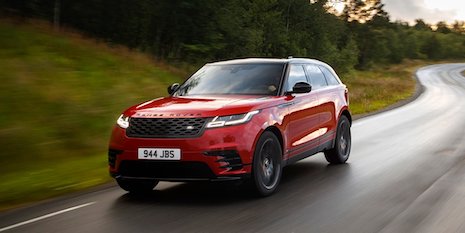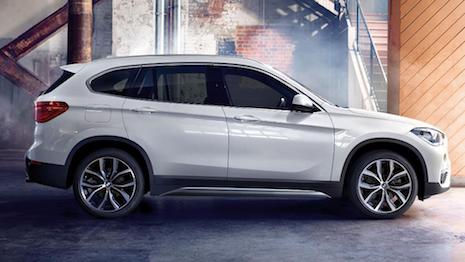The European car market saw its best first half in two decades, with growth in Germany, Spain and France outpacing the decline in the United Kingdom.
Compared to the first half of 2017, the European automotive market grew by 2.7 percent with more than 8.6 million cars sold between January and June of this year. According to data from JATO, automakers' new models and technology updates have been driving this growth.
“It was certainly a good first half for the European market and this is due to the choice that consumers now have," said Felipe Munoz, global analyst at Jato, Uxbridge, England. "Car makers continue to update and modernize their traditional models, while the range of SUVs on offer continues to grow and appeal to all kinds of budgets and needs."
Auto trends
Sports utility vehicles are the key force behind Europe's car boom.
There were 2.9 million SUV registrations in the first half, an increase of 24 percent. This past June saw 30 percent more SUV sales than June 2017, meaning this trend is likely to continue.
German automaker BMW had two of the top-selling premium SUVs, with its X1 and X5 models.

The Range Rover Velar was a top-selling SUV in Europe. Image credit: Land Rover
Mercedes' GLC/Coupe and Land Rover's Range Rover Velar were two of the most popular midsize SUV models.
Hybrids and electric vehicles are also gaining in popularity, growing by 31 percent. While the environmentally-friendly vehicles only account for less than 6 percent of the total European car sales, they make up 56 percent of the total market in Norway, 13 percent in Finland and 11 percent in Sweden.
On the other hand, diesel cars represent more than a third of the European market — 37 percent — but sales were down 17 percent from the first half of 2017. Norway and the U.K. saw diesel sales decline by 32 and 30 percent, respectively.
The decline of diesel engines is adversely affecting luxury automakers who have been slower to innovate.
Mercedes' A- and C-Class models are less in-demand, as are Audi's A3 and A4. While BMW's SUVs prove popular, demand for its 3-series dropped 21 percent.
Growth amid concerns
Overall, the automotive industry, including the luxury sector, is seeing robust growth in Europe and beyond, despite uncertainty in the British market.
Automakers throughout the U.K. are concerned over the progress of Brexit negotiations, fearing that a stalling-out of the talks could reverse the progress the industry has made.
The automotive industry has had record years of revenue growth since the Brexit vote. U.K. Automotive’s 19th annual Sustainability Report found that the manufacturing sector turned over 82 billion pounds, or about $108 billion, in 2017, marking its eight consecutive year of growth (see story).
Rolls-Royce, Mercedes and McLaren all had strong starts to the year, though Rolls-Royce and Mercedes especially benefited from their popularity in China (see story).
Luxury automakers who take note of the changing tastes of European drivers — including growing demand for electric and hybrid vehicles — have room to grow.
Earlier this spring, British automaker Jaguar Land Rover revealed its new electric vehicle, the I-Pace, making it among the first legacy automakers to challenge U.S. automotive brand Tesla, an early adopter of electric driving (see story). Jaguar Land Rover recently announced that by 2020, all of its cars would be at least partially electric-powered (see story).
More luxury car brands are following Jaguar's lead and heavily investing in electric vehicle development.
In May, BMW previewed initial designs for the electric and technology-focused iNext. In 2017, BMW Group sold more than 50,000 electric vehicles, exhibiting the importance of electric-powered automobiles in today’s auto industry (see story).
"The diesel crisis certainly affected the speed of growth in the market, but consumers are overcoming this by turning to more attractive gasoline and AFV solutions,” Jato's Mr. Munoz said.
{"ct":"jYO\/IeWREfV3\/iu8XyBvUvoXFy2cVCuSIdmXqr+TkL0lHFZu\/JqDaz0yK8s7PaUbj4eZm6twiLq2BurngFRWfiUmUN1fekwwm1bsXF7KEhfDWr1ECBeGvxXOypsilxO7QZWKWKFOXq45v6GwsTzZLKR0w2uuSgOVmEEls+xhBrfQfgyiuD8aokJdnDelZR7bbnHeL3GbLBroZluuUKQdku+pAa3PyD9snw0ySaUDaBEnLS4enPb7UtOZ3j61qGPgZ4cNY0QUz33acgwtc0H2\/hQZx0rl9Q9o5dFCoTPWe3LoA9Wkw5dwNdfo7GckqLtIjglRGzyp2xHYMDF1h9ZbZ4I4NSf2dQgu4t9v\/cSjMhC5wA9lRCZXx\/ftrJF8Y5Je4gzqL915VV1qlnEqcz\/Ngdj7mRhOSsjMl2R8LV86sOAxoOWCLFd1RV3B4cLOaOg0up4KrrBG3G4kGlbp8nBmvIGqkmn7HPJzRr7Bq3AnI8\/ERe74OfRZulMYcDF7kNgJV8s2\/wLPu1ldGc6L1XNSBZDtHukyzStwHUY+e+ZyESq8EWOFQn0HwhP0ykijgmuRiee3Sf0LcRqfUaOZ8xaTkZfa48FOtQ0V1bNIlyFdqP0YhElgblgPJgffw9U6eQp+Lxjag5H+8ZjMwa+ZaHT\/6PLUIb5ShVq5LEBE\/mkc9CDIRbU3WwCWflo6Y46CzOiPeiglOOF9VUgtBlzLms+TiXlHHbl2293ZHe8Ra4zJHf5Dq7uPYOSjonGkaCiS5Wu6rHhR1hRzXz05ApTlX5fLKOtEllqXzyqiiqKVcvyt+YsCefFzDRTwE2COSicifzui8rrARMuTacABqtKE+R+nL964qBniJQL9\/H1IDu0KoxBmHWycBDBe6XcwS3YDetkvjcNNWEAhSz8hmhDPQYheH9iix9mLfmtVMNgoLg3gvqXko3s3YVjm3NQXb81VUnqfetrtY9EmOxeSHo5ro7gr4TAgPNjZLxhMM97NAC98kEIE99D0T2Yf1yEQpN4pY5RpBf9OCGjd3tkMyNvVpo+NuWIZILOa\/AHarrKItPDtNyTiWZ3dqK72ZJBfX\/2lsQ\/006Llv6RO62EImSXqg8r9AK38cCG8lf\/\/BA8XF5xCyTu4E1Ev4BW6iorQwQnP1dijCdgr5\/+kdTvlaKEFVuYGMCauVlF9BTLGjcLTlABA9Qig7Ds0ais2jrRMgUqJZHKAJGwHV+xPrdCviSYy3VNgr5zg03ogqinaqze0Pvp6ZCMwxX\/qNrTvW6CO7reDfQpcnbdGonRqAZPrOStjS00dhB\/iNxRlPC2T+qfWmcqhdcDVBDFHy6oj+WhRLfh6fZ6BTs1LEJZ6aKuYzWY1PDzmlPP32l9IOaCmFYIlwyf4bVqndTR\/WhkqNf7MvBf37kfvNubqNMu4UKikljwYXkrzNlmPFTwad8UDGc0Gyf34q4ywIFEttLbHeSK\/sxR+yem5WQ5YCY2OLWWnh6TF9lAnIweQz\/SOFE8opeoyypmwdCSoZhMQC7fKW\/0hJLiBK6qSUjy981+RC1gN\/CPhCfIERjCufxZfwzN0VP1PAq7qqH9QmzloQC9twkxppJjKejPu19l53w6oNujoAQ7Drtg4T8qKevR9wQz5d+MCybY0phrPRPTs+ZDa7Jg2fTWMbnDBefnCkf\/iiGyn5D5fV8Cptfd8Ox7Vz+P0Yyc3Ch6X201BQb3r1V+l\/wptg01sT1IBH5q3E\/ka\/2UzPy7IQ0a7UD34+4XULtUUZIxqWTptf4C3suppgoiMFHpSdOtNEJTIwuJ5OoYZY0baI9nyhIseyO2h25yl\/sMJ0B3q\/4DA33p+kSRa1HIg77r0fqQ20vxYOopPYpmb5XYkuJCkPoR89LLr9QZYg1ue7TDYkAxzdC6jGkKgMXFc\/VYMbE4FQbc363CGPZtR+YgBj40\/giNxovlWfZIvfF3In9qU8ZdD1Z3ekXz2suXQ8j2gA3N+uNyIL36qlxFJsQy+XUQ7KdRT\/wwbN9yEHK50szZMqoT9+AvJVjGD45fJHvA1fXOEyjHY1obYdiZC68Q8bPivoMYYyUOFyBUr+qMdqaFvCyZ9y3GbfUAXnNDrZ1AU3WSGoimsQ8mDB9zcLnQxvlUS\/wp2zbQoou5POrW3EfC406eRe1i\/uvn0GZt4mprV5GchN0+Pxt5BXIYiadEcHAtqQoMZAD2o5ijz2TunPTr4N0pGofiCTpAIoEcegFTQUhu8MC1OxxfHcPdHsAqZcPREnmFycoUboUywCCztGJ3lc2ZX95s\/1IqZkFcLtikZ\/1VQyNUB2SoPtFvoeSP1WWHOKXjdcu+de3XDMlCjaNRvgfx9Bw270Oq4PyIHQTEnfxo7zXsgRwqMky4VqR8DzfKj9TG7COndP5Xwsf4yUs9ug77xisKVaD3iBcjZKWmcZHZcCQ8JSIwqwU9a3ld84iUm1pUcdIJDDihb4tRGKzY6OcbEG0DBzCYT9Tso\/O9nvWkV3e0de+JkT68BKmvPahlk7WnUTxizLQgRf6o\/9uEhG16lzSAVyIhPfjwz8vPrbNrFMQIeWKBxDDCx4Z8SSweVG9Lnm5TR7D4XwwG2XUorG9zmqw5Kpqoo+KBo4qkwIFiavcdX\/GLpzvmWAo34MDqDyTgbF\/feXCuKeulaSrAEHKYRHpDT2ugx7gYI\/O1hV730VpuCUsLMnEoJvrV+c\/0tvkcQZjX\/A5jH+isz2CpSbpEW6zTPrj02tdBIpLPm\/ILta+UuwAsj+uRJGeaCziOzejvO5C8IMvpakYYVYiso+qrjZCX1QTpjvmFP7+GaGTRX+RjqwScS3yCTvTXDkKz3oUcWeVQXdJGvG6H0Estg1R2gGz6v2wpcgjsdORwAapgtg8Y2TRH4Q9R+O6z5y5rbTmkbdJFUm9ejyD3AfMsOoHelxVQmCv\/sBtdlrlD5lOqqQMM3LhvwHbzlY4jKTyZE4DGwKIEog7dBp2IPq5qOU+gcPQ1rYei03bjZcRNShU3eJuNidJDAXfWu6Wl\/MaJNhXp93PyVzzBU1FGYAN\/HRqCctJxLoPdsbbiDcTc5gGE9CcTEdhpTvARxS3h+9gk4Q11+8sE5H61u6KMXVBB9XIooaA\/8zRBET0OJP1k7ZPWXYeBr4V41P78uxgyzTq2OtLuhNtplMkxrnW\/S2ISD+xA+DpbyU7mUC\/B7qwPJbrvJNpsmv6msVEizRShuysZUYn+BPn7tFHjx+c6milU0vS0TUh1w4fuJI5PJATpI4CxshaNhH+ohIyrrUY2DPb8s3UjSxLRhilglxAWznA5rkyNzAbvW\/KKq2WhpkGaDsMTrO\/wExDNwTlfoDwQAUwIlSFoK3zdMZZM1F1fzkSAw4xv7IWpXm9CtrbR6ZlyYYcppy2rvFTUzk1pLiASOWv5xIPeUiYJvq9QGWCaZKkZQe+t2XJ+J8+NTLvADQGyno1v3tq7PCffkh+pHEBns0x7tXwYPN5UlJMhYQwBEmGUMi9GutGLoYrXfmhy8vuNME7h+gWxCAoq1\/ghO7RfPnsE+hEAFYYP1\/TyilTrM\/PZ7fRyY3OU6O3htgT8kjBDdTam4UM63cU7t7vFX\/v6p07LurkZ4vMwkCCKi\/6rtiFh0upKKm3COYm9TX7PZ5oZSc7mrvnlLWdffhZ4pSjhs1KDYU1kY4mbLzWIuCtQf0W6oBOc5X1F19nEsyQpyVM17KPkStw2A7NTYWb9ckUwKBdAU8q61JK2eMlpk0YehFjf4jjz7Mf87buW7P6+lQWIpiBYAhlrAYLXfGelHpDULWtl6LGyg0\/ImysMFUR3\/mrSJo2oM3SVfO1AGqvpQ+omQU6vuDhRA8nuW1LPnTFmOYZkuFdXC+PSHLRgiXCnFM8ntiE+kdxgRdixA6xsnhRxqRjIBexgPJ09FpvCNr4xMIq6oEAaQM78njm9toc\/VJCWeIzOUXTtM49qDbT7vsiwEywUsI\/le6fgNzt8rtJHUmQ8v03mcEDvIG+MUPXv5\/hFFKKloMiJ9CgJoCRU4VJNMfGTlS4vaTMoIv3zoSgNum12YXHl3J4hEtmlZVrwvmlKmxaP22undv3YQCmsU8R6lG18V2GvBor0QpZQwJiezv05ENA7k2mEUevo\/gqtC9Uz2eWb9dXfROUir4qWUuMeXkyS2lMxY5rI7W+0wBRjfoOLNBCKYJlhxMaFkMyu16fmuWHx0Rd8MDeRNRiRG2HyFeVhivxmCuz7TfsWL2lxmiAELgay7HCr9a\/z7Fme3ptkaFDfqzGUNG0IXEpy82AsSSGWBtDs41fPJY4UhQUb+L82OEXCQ\/YH8+qVFtUrIYUOqEz9KoSErYY9tFgrjaAJMPLWBhK0lAMwoIKXOso4\/x0xzleDNqeM4L0OnbP9MsAh15PVwFy8Hsq+slr9Hg0q7FLEnghcYcZVngA5tQkRAUfu0MQBjdozE3H6edh0GVUalAfmH1OjfQ\/ZpowJoFyyxVijg\/BiZCO1oASbfcqFn6ULMNAfNkgE+5ZUJteVrfa2uvHRAg+wELvJKx55QV7CKOeLPtoTlNJy4p3wtw+ufec+g2IrQyOkA3+g5vJKJ+VIVBOc5GFjfwsM1nWBQZlkZmzJulpCXk2bQZ+xD32qyxvFF3fMKtIVPPFRloRIpDleQQde7SelWtYpjLgziBeqBXPbzIMtX62knqLpHA1vXDrtLQMXNBRQfAuBskqRPRYpWkOgVsb\/g8iHBzZLkqdunmkSp4ARae8GYKleA22CTt7HgtOejabGBJ32Vpdt8u9fMO7neCMNvzvQZJ47IMEnONHiEcpBN0Rj94m42TqjLc2aXISuVhoSAlcnL\/z02xuq\/uN7V0omgXaKZftBeD7hRukW4a2Mi6yOrvSLVzaK2lU9GVatFHTW5fDSEcdhWv07AcAoonudUlpcHDtfqv8oB3ClTF+2Kpu6Ox4YDydGSM7Olnu3vi8KpizPGV3i7H2gAhZt2hLERPM4QeRujt5eg4vFPrKh6SqpSvICqieKb9fzpBodhJz3cXKzX7ZP5XpdssY0ygQuGDGh1Gzfmkrc9RuBdJKemVHnxjYsCZVzteQgnMnRK\/aock7I6IJedX5ryeRUSiIOkncHWZ0FYxNbsOL2vajo8LXaqfx\/wJt3cXa11UYAwfGEvi36F\/sOA+mRY+Y7mdWXQnDIRme9FWBQTm9+KeNZE79W9vw73U\/vIMe7sSlvfYT0R5AktDvv4uQEVnnGVWt7WtOfJK40qeOMEkLtWQDvmyAr\/GDgGSXkBpgu8MkuCFsbfNxXEcLM8RlzsWbjlsiOC3FEN0zsBQd3QSOKswDF\/wMTuIJHlaAxFm04d3peXhE5wjxFHItbke1DUzE5UxJ2xrEq6TBH2l3fbDr6C1qIoGPmn8rI217\/djPvzerp1ZkalnpRCdgfqIUh1IOYPku2nb6zmr\/oA+aqKn5zxjPyHlcPWHaTs1gW5ZO6R6z+RFlyl1TcNwAKZD3vHSEhgZ8aMVyr+fcNe4j6u+qb0ZrirMnnDnpGN4XKC\/72DSUSt8KAdPqmz1jBlFnXPDurs4ljatbTMjg7F9AJeVrFPfuklWxBxQPs2LFWsnxlD3zVQRxSBkMMSJH+4FesdQj4O+YkfmhI+IddYZAtM2ag7Loajmqhu+5DkNSmsFoYpVZEUnJeEiNHDulomTbDY0dlvvNi30kw0PP\/amg6+d40U4HT4tZBHu1h+W8Q8IEaPzxl6WAV5oFidaap70PRlZTjwmnp2Iz0E3JVj1Fp8u1yl\/JpCSHonrLH88yGmlclVeEhvBaHByxYy9kQD898m7jUYALV5OSdxXkj+Jbj1zr6p24FOonrkI2cK8oL9PE+UTwsajtmQfPgKAmamnLma36r5dsN8F8mfIUZERc8tdMKzVMbk22oTJRbe2\/V3xqZ4oQHDLofNWN2U5He3HC7UkGmGdE0HhGKH3Rruwb4fJ\/+y3aRiEBvtuqI\/1SNgy+q\/BC6cM7cEudGj6Q0Gl0mZ7ILeK2vrtKkx0YwzNVv7P\/z6TJ8DeLr65VIdwR1lOq4HVaPkR4MEhGGOoWmS6qDuuyAPUpp+WL3lxNFzKXGUS3cNTdFsI4VCebLqAOr4BQUUBStx6Iu1EUbrZw28WpJIHc\/YUAIrO+xmiHY9w4SZzooB+NB9Uz8tARFMf8K7qCGQvOEda5Witji5tue6762NfTpbiT7grfRH+RTZfCNok7m5uTsPlxe\/fyUQxNCCBu4fG8IUrzdf5jQ31mcYdGxad9LiqSHg\/lzRak92KzYkY+UilCcBVBJ4TqdkA50WcK7fvW4WQtSW42IBJRORbeykFCHSmYM70s2qmdXZXajHjwlCY9a7l9JUw3w2LWeMh8Xjd61r6If7bJdJ22gVdabj7moX8rflo5VCR3HiwHgHkuCmJMF+uuBcOz\/MoumKpaMOUs5h8TAu1j2z6wo9md73suK4TTczTkAePHyzl1hIA623FhI8s6OjIgujrq24+yf5HPomTlgwAH6tJdQtiGwIsfj5j\/n6S+RfqCnub1TfOodsxnoahpqu3AKSzW9kzdsjpZdwuIxYZ8tbr+e7d40HaOKj3gwajVf\/lwjFLQ6Z2z+ulJ+5WrdKdXcAQXvwguGsI+y34HDsy00X7FELE0Uq+ijUaKAdeW7Wx50KmsL0rO+ANu3bnmNal+5LC6gqNoFfB166\/teIqadnZap1g9d29opv\/DT0Yd9NF2vuO3lmT1\/mRAqQEnTkdZPwlXu2AmvfCCesDNBJ33pa27W0rz4tSRTWSiKq1+B9Ov1B0yLMIctz2qRLaQaLeHWPiauvo\/ZnvkyRsGn7Qw+Qg4u\/5TwzRcl68Ag9Jpgm3gGiTlQa6mQ\/qSUfV2AUhuM2Atc7zRO1PgA8h4StqpmemPvYRm3ZYPYyVRGKmtwVm57nYZmb40dwNEWv3ysPG\/BCS2fBzKAdCI3FwMJuY8cYPv\/6xoIjbe8wjbOv5depAKmlSgK0kd3DpW42gbJO7ujxw0ZLdDXksVZN\/uReKMUjoKexyiyfyKoNLYGhVQN1MntevoVr4dKHDGrBYtDzKOKw0IgyE83uCcpdoQHBkiDCRVtKeOkYsFyU7j3NYVYlLyExx8O9Lr\/xwFPl1cK+PzG3TgcFsrrWEahA10hGSrCDUxliVEm3ENoK7mOkJdYT0e\/+I8mEv\/eOTjaELnyW9bByoyRJNGTIVgl46BHCSDJMKPpNfRV8sJfHOGpT+phgPTQLAyEKdo18V9Ce\/COYdemacYwlV1ifFpuechxB7CSKxvunX39tV3FJHmyiNWtK\/ab9zLYFoov8Ghun","iv":"691ada94d8108fd297d874fe95cde433","s":"3ff8571c45a43f92"}

 The BMW X1 was Europe's top-selling premium compact SUV in H1 2018. Image credit: BMW
The BMW X1 was Europe's top-selling premium compact SUV in H1 2018. Image credit: BMW